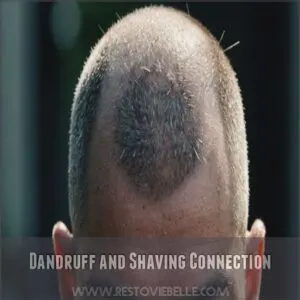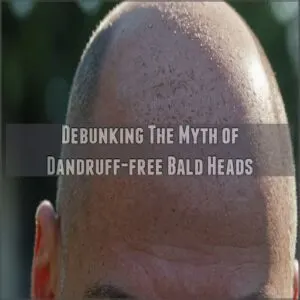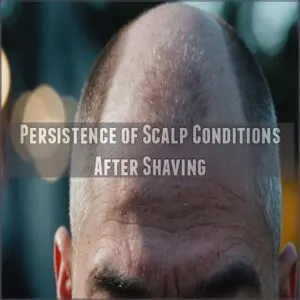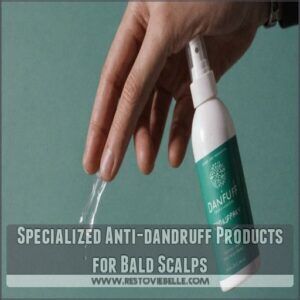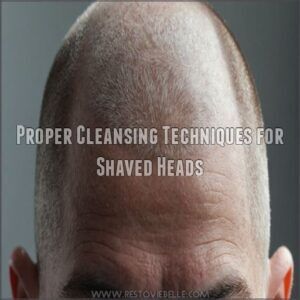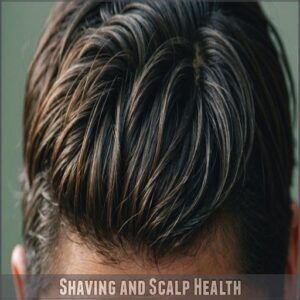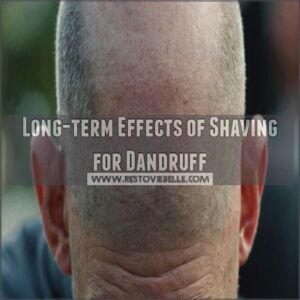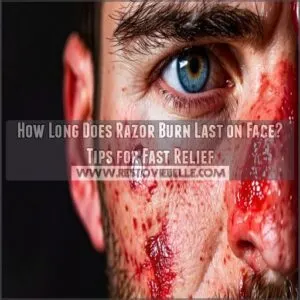This site is supported by our readers. We may earn a commission, at no cost to you, if you purchase through links.
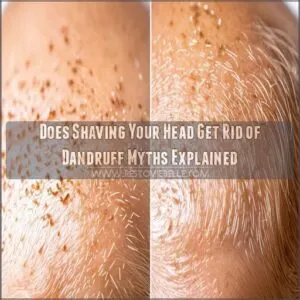 Shaving your head won’t actually get rid of dandruff, though it might seem like a quick fix.
Shaving your head won’t actually get rid of dandruff, though it might seem like a quick fix.
While you’ll temporarily see fewer flakes (since there’s no hair for them to cling to), dandruff is a scalp condition that persists even without hair.
Think of it like sweeping dust under a rug – the underlying issue is still there.
You might even notice your scalp becoming more irritated from regular shaving.
The good news? A shaved head makes it easier to spot problem areas and apply treatments directly to your scalp.
Understanding the real causes of dandruff can lead to more effective solutions than just reaching for the razor.
Table Of Contents
- Key Takeaways
- Dandruff and Shaving Connection
- Does Shaving Eliminate Dandruff
- Managing Dandruff on a Shaved Head
- Shaving and Scalp Health
- Long-term Effects of Shaving for Dandruff
- Alternatives to Shaving for Dandruff Treatment
- Frequently Asked Questions (FAQs)
- Should you shave your head for dandruff?
- Does shaving reduce dandruff?
- Can shaved hair cause dandruff?
- Do dandruff treatments work if you have no hair on your head?
- Should I shave my hair if I have dandruff?
- How do you get rid of dandruff permanently?
- Will shaving my head help my scalp?
- Is it good to scrape off dandruff?
- Can scalp moisturizers prevent dandruff after shaving?
- How often should you wash a freshly shaved head?
- Will hair texture change when regrown after shaving?
- Does scalp massage help with dandruff control?
- Can certain diets reduce dandruff on shaved heads?
- Conclusion
Key Takeaways
- Shaving your head won’t cure dandruff since it’s a scalp condition caused by fungus and oil production, not hair length.
- You’ll temporarily see fewer visible flakes after shaving, but the underlying scalp issues will persist and may even worsen from razor irritation.
- Your shaved head makes it easier to apply anti-dandruff treatments directly to problem areas, but you’ll need to protect your exposed scalp from sun damage.
- You’re better off treating dandruff with medicated shampoos, proper scalp care, and lifestyle changes rather than reaching for the razor.
Dandruff and Shaving Connection
When you shave your head, you might think it’s a quick fix for dandruff, but it doesn’t address the root causes.
Shaving can affect scalp health by causing dryness and irritation, potentially stressing the sebaceous glands, which mightn’t resolve dandruff problems.
Impact of Shaving on Scalp Health
Shaving your head can impact scalp health in several ways.
It’s a bit like giving your scalp a fresh start, but it’s not a magic bullet.
Here’s what you should know:
- Razor burn is a common side effect, leading to irritation.
- Improper shaving technique can damage hair follicles.
- Maintaining good scalp hygiene is essential after shaving.
Ignoring this can lead to problems.
Exfoliation Effects of Shaving
Imagine smoothing down a road with a fine brush—each stroke lifts away dead skin and oils.
Shaving your head acts like gentle exfoliation, whisking away flakes and giving your scalp a fresh start.
However, watch out for sensitive skin irritation if you’re not careful with the razor type or frequency, as that can lead to pesky problems.
Sebaceous Gland Stress From Shaving
Exfoliating with a razor isn’t just about ditching flakes; it also affects your scalp’s oil production.
You might picture your sebaceous glands working overtime, like tiny workers racing to compensate for frequent shaving.
This sebum imbalance can lead to razor burn irritation and hair follicle damage if not managed properly, leaving your scalp feeling unsettled and out of control.
Potential for Skin Irritation and Dryness
You’ve shaved your head for a fresh start, but beware of skin irritation and dryness lurking around the corner.
Shaving can actually make dandruff worse, considering it can cause irritation, dryness, and inflammation, potentially leading to increased oil production and flaking, as seen in cases of underlying scalp conditions like seborrheic dermatitis.
Keep these tips in mind:
- Shaving techniques: Use a sharp razor to minimize razor burn.
- Scalp hydration: Moisturize daily with suitable products.
- Aftershave products: Choose ones with soothing ingredients like aloe to calm irritation.
Following these keeps your scalp smooth and comfortable.
Does Shaving Eliminate Dandruff
If you think shaving your head will magically eliminate dandruff, you’re in for a surprise.
Dandruff results from scalp conditions and fungus, not hair length, so even a bald head isn’t immune.
Debunking The Myth of Dandruff-free Bald Heads
Regarding shaving and scalp health, a common myth is that baldness eliminates dandruff.
However, dandruff’s root causes—fungal activity and scalp oils—persist, unaffected by merely shaving the head.
While baldness might temporarily hide flakes, the underlying issues remain.
For effective treatment options, focus on specialized anti-dandruff products and techniques rather than hoping for a quick shave solution.
Persistence of Scalp Conditions After Shaving
Shaving your head might seem like a quick fix, but unfortunately, dandruff persists.
The shaving impact on scalp health is minimal regarding dandruff itself.
Underlying scalp conditions, like seborrheic dermatitis, remain.
Factors such as a yeast overgrowth like Malassezia globosa can still thrive in oily environments, causing scalp irritation and flakes why dandruff persists.
Scalp irritation can even worsen after shaving due to dryness.
So, while shaving offers a fresh look, it doesn’t solve the root problem.
You’ll still need to treat the dandruff.
Differences Between Dandruff and Dry Skin Flakes
Even after shaving your head, those pesky flakes might stick around – but wait, are they dandruff or just dry skin?
Here’s how to tell the difference: flake size, texture, and scalp condition hold the answers.
- Dandruff flakes are typically larger, yellowish, and oily – think cornflake-sized patches
- Dry skin flakes are smaller, whiter, and powdery – like a light dusting of snow
- Dandruff often comes with redness and itching, while dry skin just feels tight
Role of Fungus in Dandruff Development
Unlike dry skin flakes, dandruff’s true culprit is often a fungus called Malassezia globosa.
This naturally occurring yeast feeds on your scalp’s oils, creating byproducts that trigger skin cell turnover and inflammation.
Your scalp’s microbiome usually keeps these fungi in check, but factors like stress or hormonal changes can lead to fungal overgrowth.
That’s why antifungal treatments, not just moisturizers, are key to managing dandruff.
Managing Dandruff on a Shaved Head
You’ll need specific strategies to manage dandruff on your shaved head since the condition doesn’t disappear with hair removal.
Shaving your head makes it easier to apply anti-dandruff treatments directly to problem areas.
You’ll still need to maintain a consistent care routine using specialized products and proper cleansing techniques.
Specialized Anti-dandruff Products for Bald Scalps
Bald scalps need specialized products to combat dandruff effectively.
Here’s what works best for your shaved head:
- Zinc pyrithione-based scalp sprays that absorb quickly without residue
- Lightweight, oil-free serums containing ketoconazole
- Fast-drying antifungal treatments with selenium sulfide
- Non-greasy medicated moisturizers, such as those found in an anti-dandruff scalp moisturizer, designed for direct scalp contact.
These products work differently than regular anti-dandruff shampoos, targeting the scalp directly without hair interference.
You’ll notice faster results since there’s no hair barrier.
Proper Cleansing Techniques for Shaved Heads
Keeping your shaved head clean requires more than just soap and water.
Start with a gentle, sulfate-free cleanser specifically designed for scalp care.
Massage it in circular motions using your fingertips, not nails, to remove dead skin cells and excess oil.
Rinse thoroughly with lukewarm water – hot water can strip natural oils.
For best results, cleanse your scalp daily, especially after sweating.
Moisturizing to Prevent Dryness and Irritation
After shaving your head, proper moisturizing becomes your scalp’s best friend.
These three essential steps will keep your scalp healthy and flake-free:
- Apply a lightweight, non-comedogenic moisturizer right after shaving
- Massage natural oils like jojoba or argan into your scalp before bed
- Use an alcohol-free aftershave balm to soothe any post-shave irritation
Remember, consistency is key – your scalp needs daily hydration to stay happy and healthy.
Protecting The Scalp From Environmental Factors
The exposed scalp needs robust protection against nature’s elements.
You’ll want to shield your head from both scorching sun and biting winter winds.
| Environmental Factor | Impact on Scalp | Protection Method |
|---|---|---|
| UV Rays | Sunburn, aging | SPF 30+ sunscreen |
| Cold Weather | Dryness, flaking | Moisture-wicking beanie |
| Wind | Irritation, debris | Light head covering |
| Humidity | Oiliness, bacteria | Antibacterial wipes |
| Pollution | Free radical damage | Antioxidant serum |
Shaving and Scalp Health
You’ll notice both positive and negative changes in your scalp health when you shave your head, from better product absorption to possible skin irritation.
While shaving can help you spot scalp issues more easily and temporarily hide flakes, it won’t cure your underlying dandruff condition.
Improved Visibility of Scalp Issues
Shaving your head creates a clear window into your scalp’s health, making it easier to spot potential issues before they worsen. You’ll notice changes in skin texture, color variations, and early signs of conditions that might’ve gone undetected under hair coverage.
- Redness or inflammation becomes immediately visible
- Unusual spots or patches are easier to monitor
- Early signs of sun damage can be spotted quickly
- Changes in scalp texture signal potential problems
Enhanced Product Absorption After Shaving
Bald scalps absorb anti-dandruff products more effectively since there’s no hair blocking the way.
Your freshly shaved head becomes an ideal canvas for treatments to penetrate deeply into the skin, which is particularly beneficial for those suffering from dry scalp issues caused by an imbalance in natural oils or harsh shampoos containing sulfates. Understanding dry scalp.
Now you’ll get more bang for your buck with treatments working directly on problem areas.
| Treatment Type | Absorption Rate | Benefits |
|---|---|---|
| Medicated Shampoo | Very High | Direct contact with scalp |
| Essential Oils | Enhanced | Even distribution |
| Moisturizers | Maximum | Better penetration |
Temporary Relief From Visible Flakes
While a clean-shaven head temporarily hides dandruff flakes, it’s not a long-term solution.
Using a dandruff-specific product, such as medicated dandruff shampoo, can help manage symptoms.
You’ll notice immediate visual improvement since there’s no hair for flakes to cling to.
However, this relief is short-lived as dandruff affects your scalp, not your hair.
Regular scalp hygiene remains essential, and you’ll need to maintain proper sun protection for your exposed scalp.
Potential Aggravation of Existing Scalp Problems
Regular head shaving may worsen existing scalp conditions.
If you’re already dealing with dandruff, razor burn and ingrown hairs can add to your discomfort.
The constant friction from blades can trigger inflammation, especially if you have a sensitive scalp.
You might notice increased dryness, redness, or even small bumps.
Taking breaks between shaves and using a gentle touch helps minimize these issues.
Long-term Effects of Shaving for Dandruff
You’ll notice significant changes in your scalp’s health when you maintain a shaved head long-term, from shifts in oil production to increased sun sensitivity.
While shaving won’t cure your dandruff, it can affect how your scalp produces natural oils and how effectively treatments work on your skin.
Impact on Hair Follicles and Regrowth
Shaving your head won’t damage your hair follicles, as the razor only cuts the visible hair shaft above the skin.
Your follicles continue their natural growth cycle beneath the surface, unaffected by shaving.
If you’re worried about regrowth, you’ll find the hair returns at the same thickness and texture as before.
The only changes you might notice are temporary, like stubble feeling coarse.
Changes in Sebum Production Over Time
Your scalp’s oil production naturally shifts after you start shaving your head.
In the first few weeks, your sebaceous glands might go into overdrive, producing extra sebum as they adjust to the new environment.
Over time, you’ll notice your scalp finding its balance – some people experience less oiliness, while others maintain steady production.
This variation depends on your age, hormones, and individual skin type.
Potential for Increased Sun Damage
A shaved head exposes your scalp to direct sunlight, increasing sunburn risk and potential skin cancer.
While sebum production might stabilize, UV rays can still damage unprotected skin.
Always apply broad-spectrum sunscreen with SPF 30 or higher to your scalp, and reapply every two hours when outside.
Consider wearing a hat for extra protection, especially during peak sun hours between 10 AM and 4 PM.
Psychological Effects of Maintaining a Shaved Head
While protecting your scalp from sun damage matters, the mental impact of maintaining a shaved head deserves attention.
You’ll likely experience a mix of reactions – both positive and negative.
Many people report increased confidence and a sense of control over their appearance, while others need time to adjust to their new look.
Social perceptions vary, but embracing this change often leads to improved self-image and acceptance.
Alternatives to Shaving for Dandruff Treatment
You don’t need to reach for the razor to tackle your dandruff problems, as there are several proven treatments available that can effectively manage your flaky scalp.
From medicated shampoos to natural remedies and lifestyle adjustments, you’ll find options that work with your current hairstyle while targeting the root causes of dandruff.
Medicated Shampoos and Their Effectiveness
Medicated shampoos pack a powerful punch against stubborn dandruff when used correctly.
These specialized formulas offer targeted treatment through their active ingredients:
- Ketoconazole shampoos block fungal growth and reduce inflammation
- Selenium sulfide products, such as those found in Selenium Sulfide Shampoo, control cell turnover and oil production
- Zinc pyrithione formulas fight both bacteria and fungi
- Coal tar solutions slow down skin cell death and shedding
For best results, massage these shampoos into your scalp and let them sit for 5 minutes before rinsing.
Lifestyle Changes to Reduce Dandruff
Beyond shampoos and treatments, simple lifestyle tweaks can keep dandruff at bay.
Start by managing stress through regular exercise and meditation, as stress often triggers flare-ups.
Stay hydrated by drinking plenty of water, and get adequate sleep to support scalp health.
A balanced diet rich in zinc, biotin, and omega-3s helps maintain healthy skin.
Regular scalp massage improves circulation and reduces buildup.
Natural Remedies and Their Efficacy
Natural remedies can effectively tackle dandruff without harsh chemicals.
You’ll find coconut oil’s antimicrobial properties help combat scalp issues, while tea tree oil‘s antifungal benefits reduce flaking.
Try mixing aloe vera gel with a few drops of essential oils for a soothing scalp treatment.
Apple cider vinegar‘s acidity helps balance scalp pH, but dilute it first to avoid irritation.
When to Consult a Dermatologist
While home remedies can work wonders, some scalp issues need professional attention.
You should book an appointment with a dermatologist if you’re dealing with persistent dandruff that hasn’t improved after 4-6 weeks of treatment, severe flaking accompanied by bleeding or sores, or unusual symptoms like patches of hair loss.
They’ll examine your scalp, identify underlying causes, and create a personalized treatment plan that actually works.
Frequently Asked Questions (FAQs)
Should you shave your head for dandruff?
Shaving your head won’t cure dandruff since it’s a scalp condition, not a hair problem.
You’ll still need proper treatment like medicated shampoo or dermatologist care to address the underlying cause.
Does shaving reduce dandruff?
Unfortunately, scalp issues don’t disappear with a buzz cut.
When you shave your head, you’re only removing visible hair – not treating the underlying causes of dandruff, which affect your skin’s surface.
Can shaved hair cause dandruff?
Hit the nail on the head – your freshly shaved scalp can trigger dandruff.
The shaving process stresses your sebaceous glands and can dry out your skin, making you more prone to flaking.
Do dandruff treatments work if you have no hair on your head?
Yes, dandruff treatments still work on a bald head because they target your scalp, not your hair.
You’ll need to use medicated shampoos or scalp treatments to address the underlying cause of flaking.
Should I shave my hair if I have dandruff?
Shaving your head won’t cure dandruff since it’s a scalp condition, not a hair problem.
You’ll still need proper treatment.
Consider trying medicated shampoos and scalp care first before making this big change.
How do you get rid of dandruff permanently?
Unfortunately, there’s no permanent cure for dandruff, but you can keep it under control with medicated shampoos, proper scalp care, and regular treatment.
Consider seeing a dermatologist for a personalized management plan.
Will shaving my head help my scalp?
While cutting your hair short can help manage scalp issues temporarily, it won’t address the root cause.
You’ll need proper treatment and care to effectively tackle scalp problems, regardless of hair length.
Is it good to scrape off dandruff?
It’s not recommended to scrape off dandruff – you’ll risk irritating your scalp and making things worse.
Instead, try using medicated shampoo and gentle exfoliation techniques to naturally remove those pesky flakes.
Can scalp moisturizers prevent dandruff after shaving?
Using the right moisturizer can help prevent dandruff after shaving by keeping your scalp hydrated.
Look for products with antifungal ingredients like zinc pyrithione, and apply them regularly after each shave.
How often should you wash a freshly shaved head?
For a freshly shaved head, you’ll want to wash daily or every other day to remove oils, sweat, and dead skin cells.
Regular cleansing helps prevent buildup and keeps your scalp healthy.
Will hair texture change when regrown after shaving?
Your hair won’t change texture after shaving – that’s a myth.
The blunt ends from shaving might make it feel different at first, but the actual texture stays exactly as it was before.
Does scalp massage help with dandruff control?
Like a gentle rain soothes dry earth, scalp massage improves blood flow and distributes natural oils across your scalp.
Regular gentle massage can help control dandruff by reducing stress and promoting healthier skin cells.
Can certain diets reduce dandruff on shaved heads?
Eating foods rich in zinc, omega-3s, and vitamin B can help control scalp oil production on your shaved head.
You’ll get better results by combining a healthy diet with proper scalp care.
Conclusion
Think of dandruff like a persistent house guest – shaving your head won’t make it pack up and leave.
While shaving your head might seem like a quick solution, it’s merely hiding the flakes temporarily.
Instead of reaching for the razor, focus on treating the root cause with medicated shampoos, proper scalp care, and lifestyle adjustments.
Remember, a healthy scalp needs consistent care, whether you’re sporting a full head of hair or rocking the bald look.
